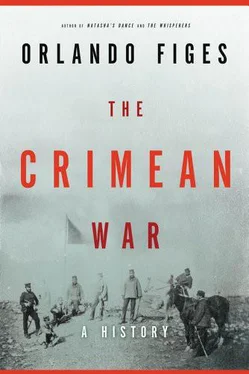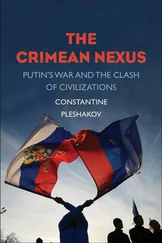—
Booklist
Praise from the United Kingdom for The Crimean War
‘A wonderful subject, on every level, and with Orlando Figes it has found the historian worthy of its width and depth.’
—Norman Stone,
Standpoint
‘Figes’ new work will remind readers of his gifts, keen judgment and mastery of sources.’
—Max Hastings,
The Sunday Times
‘This is the only book on the Crimean War anyone could need. It is lucid, well-written, alive and sensitive. Above all, it tells us why this neglected conflict and its forgotten victims deserve our remembrance.’
—Oliver Bullough,
The Independent
‘Figes is a first-class historian… an excellent guide to the vagaries of the battlefield and the suffering of the ordinary soldiers… and the extent to which this was a religious war.’
—Dominic Sandbrook,
The Daily Telegraph
‘A fine, stirring account, expertly balancing analysis… with an impressive narrative across the vast panoramic sweep of the war.’
—Mark Bostridge,
Financial Times
‘Excellent… I could not help but marvel at the many parallels with the present.’
—Anne Applebaum,
The Spectator
‘A stellar historian. As ever, Figes mixes strong narrative pace, a grand canvas and compelling ideas about current geopolitical tensions.’
—Tristram Hunt,
The Observer
‘Entertains as well as enlightens… With its account of combat in the Balkans and conflict in Iran, Afghanistan and Jerusalem, [ The Crimean War ] makes the modern reader blink with recognition.’
—Angus Macqueen,
The Guardian
‘A complex tale, told vividly by Figes.’
—
The Economist
Copyright © 2010 by Orlando Figes
All rights reserved.

Metropolitan Books
Henry Holt and Company, LLC
Publishers since 1866
175 Fifth Avenue
New York, New York 10010
www.henryholt.com
Metropolitan Books ®and  ®are registered trademarks of Henry Holt and Company, LLC.
®are registered trademarks of Henry Holt and Company, LLC.
Published simultaneously in the United Kingdom by Penguin Books, London, as Crimea .
eISBN 9781429997249
First eBook Edition : April 2011
Library of Congress Cataloging-in-Publication Data
Figes, Orlando.
The Crimean War : a history / Orlando Figes.—1st ed.
p. cm.
“Published simultaneously in the United Kingdom by Penguin Books, London”—T.p. verso.
Includes bibliographical references and index.
ISBN 978-0-8050-7460-4
1. Crimean War, 1853 – 1856. I. Title.
DK214.F53 2010
947’.0738—dc22
2010023152
ISBN: 978-0-8050-7460-4
Henry Holt books are available for special promotions and premiums. For details contact: Director, Special Markets.
First Edition 2010
According to medieval Russian chronicles, the lands of Japheth were settled by the Rus′ and other tribes after the Flood in the Book of Genesis.
The Russians were steadily extending their system of fortresses along the Terek river (the ‘Caucasus Line’) and using their newly won protectorate over the Orthodox Georgian kingdom of Kartli-Kacheti to build up a base of operations against the Ottomans, occupying Tbilisi and laying the foundations for the Georgian Military Highway to link Russia to the southern Caucasus.
Not to be confused with Mehmet Ali, the Egyptian ruler.
The name reverted to the Gold Cup after the outbreak of the Crimean War.
There is an obvious comparison with the Western view of Russia during the Cold War. The Russophobia of the Cold War era was partly shaped by nineteenth-century attitudes.
It also influenced British public opinion on the eve of the Crimean War. In May 1854, ‘The True Story of the Nuns of Minsk’ was published in Charles Dickens’s journal Household Words . The author of the article, Florence Nightingale, had met Makrena in Rome in 1848 and had written an account of her ordeal which she then put in a drawer. After the battle of Sinope, when the Russians destroyed the Turkish fleet in the Black Sea, Nightingale brought out the article, which she thought might help to drum up popular support against Russia, and sent it to Dickens, who shortened it into the version that appeared in Household Words .
In 1850 the British public applauded the decision by Palmerston to send the Royal Navy to block the port of Athens in support of Don Pacifico, a British subject who had appealed to the Greek government for compensation after his home was burned down in an anti-Semitic riot in Athens. Don Pacifico was serving as the Portuguese consul in Athens at the time of the attack (he was a Portuguese Jew by descent) but he had been born in Gibraltar and was thus a British subject. On this basis (‘Civis Britannicus Sum’), Palmerston defended his decision to dispatch the fleet.
The Austrians and Prussians had agreed to follow Russia’s example, but then backed down, fearing it would cause a break with France. They found a compromise, addressing Napoleon as ‘Monsieur mon frère.’
The Prime Minister, Lord Aberdeen; Lord John Russell, leader of the House of Commons; Foreign Secretary Lord George Clarendon; Sir James Graham, First Lord of the Admiralty; and Palmerston, at that time Home Secretary.
Nesselrode was supported by Baron Meyendorff, the Russian ambassador in Vienna, who reported to the Tsar on 29 November that the ‘little Christian peoples’ would not fight on Russia’s side. They had never received any help from Russia in the past and had been left in ‘a state of military destitution’, unable to resist the Turks ( Peter von Meyendorff: Ein russischer Diplomat an den Höfen von Berlin und Wien. Politischer und privater Briefwechsel 1826 – 1863 , ed. O. Hoetzsch, 3 vols. (Berlin and Leipzig, 1923), vol. 3).
A reference to the expeditionary force of General Oudinot in 1849 – 50 which attacked the anti-papal Roman Republic and brought back Pius IX to Rome. The French troops remained in Rome to protect the Pope until 1870.
In the Opium Wars of 1839–42.
A reference to the Don Pacifico affair.
In the battle of Poltava (1709) Peter the Great defeated Sweden and established Russia as a Baltic power.
It is one of the ironies of the Crimean War that Sidney Herbert, the British Secretary at War in 1852 – 5, was the nephew of this senior Russian general and Anglophile. Mikhail was the son of Count Semyon Vorontsov, who lived for forty-seven years in London, most of them after his retirement as Russia’s ambassador. Semyon’s daughter Catherine married George Herbert, the Earl of Pembroke. A general in the war against Napoleon, Mikhail was appointed governor-general of New Russia in 1823. He did a great deal to establish Odessa, where he built a magnificent palace, promoted the development of steamships on the Black Sea and fought in the war against the Turks in 1828 – 9. Following the Anglophile traditions of his family, Vorontsov built a fabulous Anglo-Moorish palace at Alupka on the Crimea’s southern coast, where the British delegation to the Yalta Conference stayed in 1945.
Читать дальше


 ®are registered trademarks of Henry Holt and Company, LLC.
®are registered trademarks of Henry Holt and Company, LLC.










